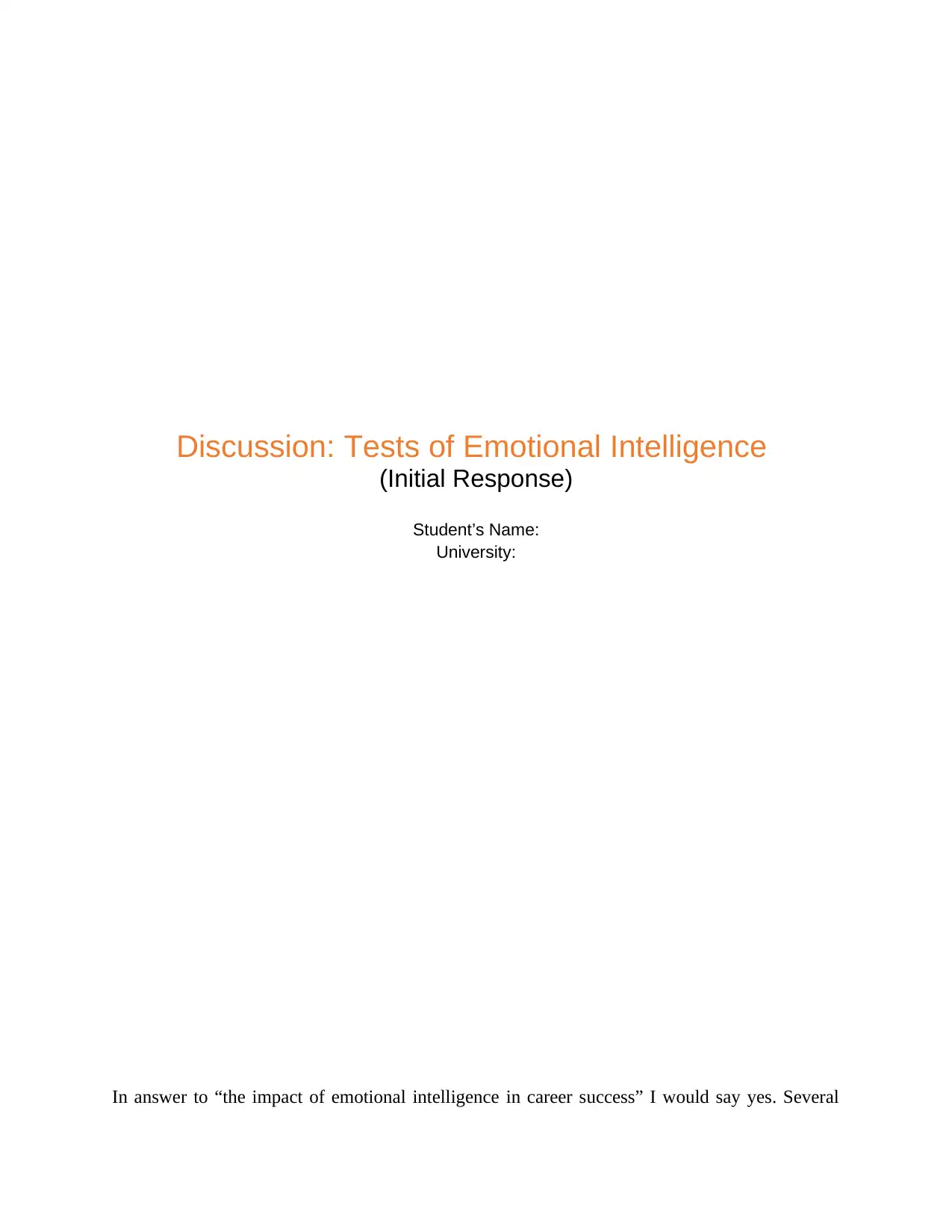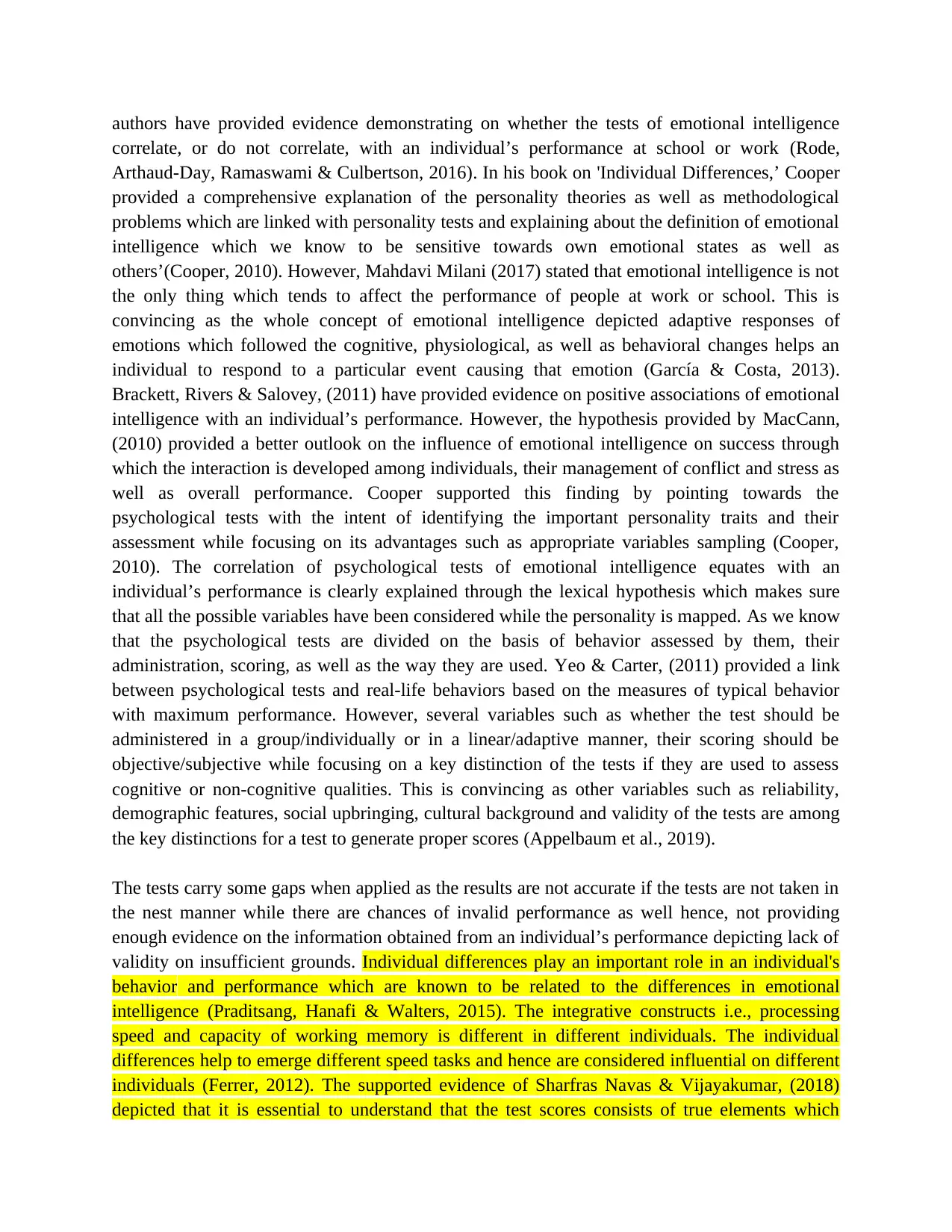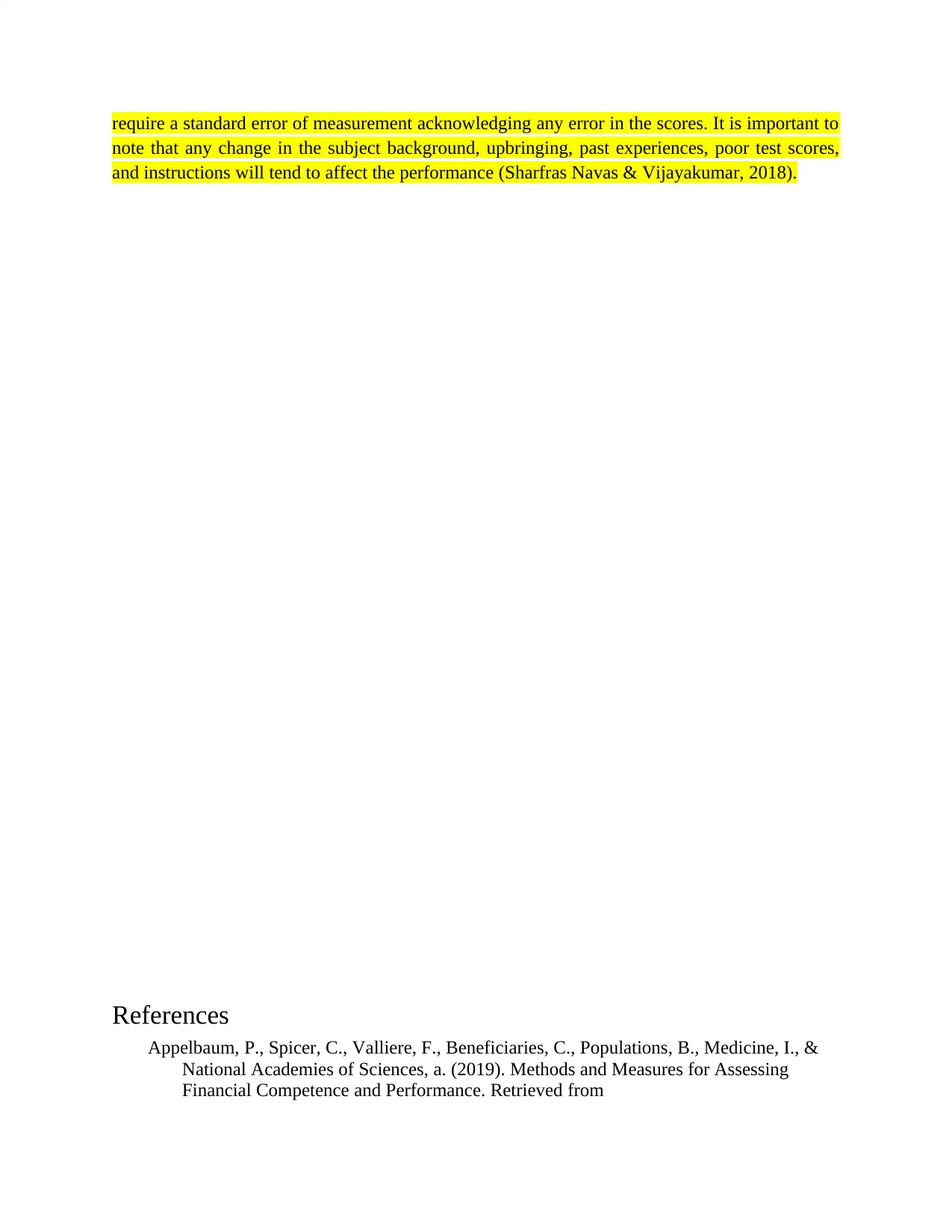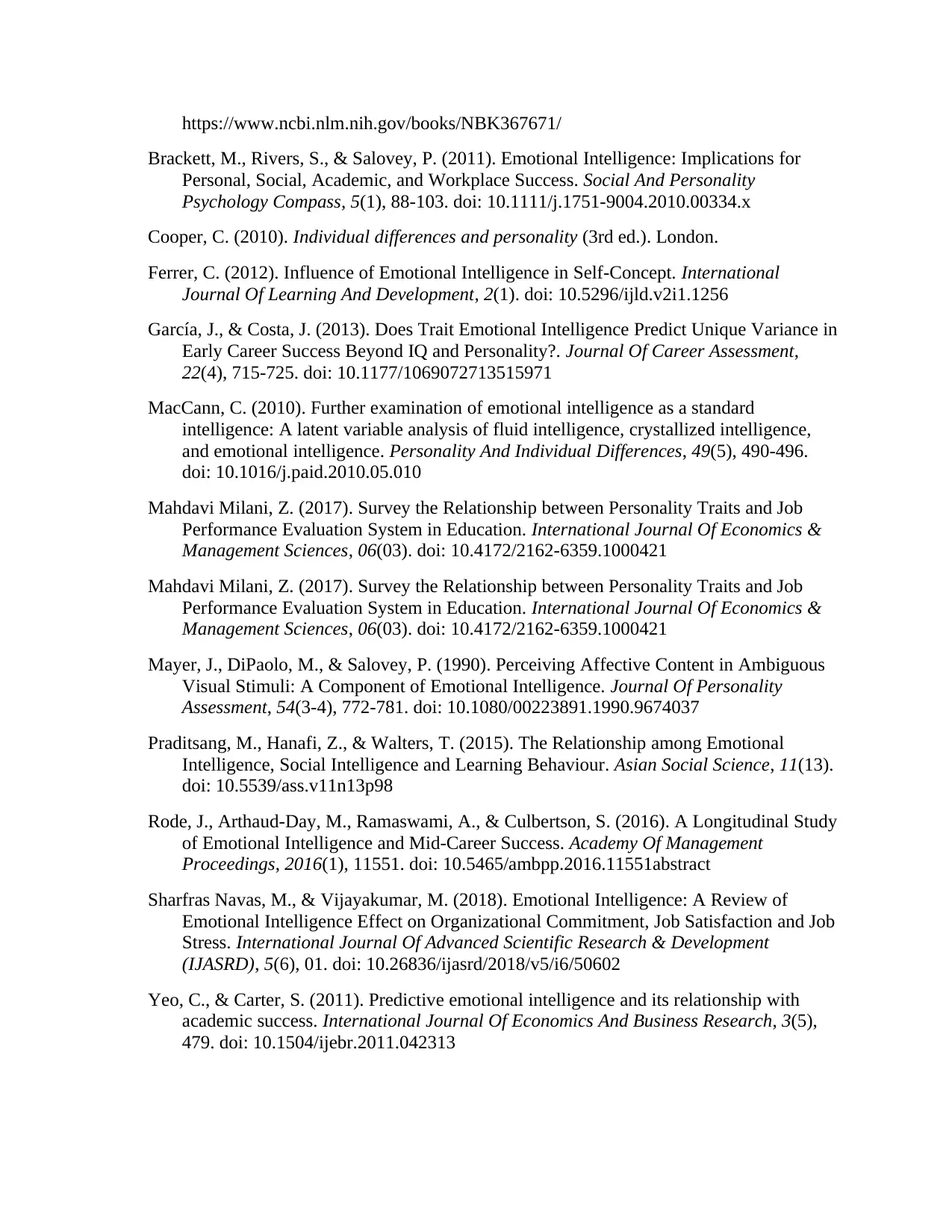Analyzing Emotional Intelligence Tests and Career Success Factors
VerifiedAdded on 2023/04/23
|5
|1248
|251
Discussion Board Post
AI Summary
This discussion board post examines the impact of emotional intelligence on career success, referencing various studies and theories. It considers the correlation between emotional intelligence tests and individual performance, highlighting the importance of emotional intelligence in managing conflict, stress, and overall performance. The discussion also addresses methodological problems associated with personality tests and the role of individual differences, such as processing speed and working memory capacity. It emphasizes the need to account for variables like reliability, demographic features, social upbringing, and cultural background when interpreting test scores, while acknowledging potential gaps and limitations in the tests. The post concludes by stressing the importance of understanding the true elements of test scores and recognizing the influence of various factors on individual performance.

Discussion: Tests of Emotional Intelligence
(Initial Response)
Student’s Name:
University:
In answer to “the impact of emotional intelligence in career success” I would say yes. Several
(Initial Response)
Student’s Name:
University:
In answer to “the impact of emotional intelligence in career success” I would say yes. Several
Paraphrase This Document
Need a fresh take? Get an instant paraphrase of this document with our AI Paraphraser

authors have provided evidence demonstrating on whether the tests of emotional intelligence
correlate, or do not correlate, with an individual’s performance at school or work (Rode,
Arthaud-Day, Ramaswami & Culbertson, 2016). In his book on 'Individual Differences,’ Cooper
provided a comprehensive explanation of the personality theories as well as methodological
problems which are linked with personality tests and explaining about the definition of emotional
intelligence which we know to be sensitive towards own emotional states as well as
others’(Cooper, 2010). However, Mahdavi Milani (2017) stated that emotional intelligence is not
the only thing which tends to affect the performance of people at work or school. This is
convincing as the whole concept of emotional intelligence depicted adaptive responses of
emotions which followed the cognitive, physiological, as well as behavioral changes helps an
individual to respond to a particular event causing that emotion (García & Costa, 2013).
Brackett, Rivers & Salovey, (2011) have provided evidence on positive associations of emotional
intelligence with an individual’s performance. However, the hypothesis provided by MacCann,
(2010) provided a better outlook on the influence of emotional intelligence on success through
which the interaction is developed among individuals, their management of conflict and stress as
well as overall performance. Cooper supported this finding by pointing towards the
psychological tests with the intent of identifying the important personality traits and their
assessment while focusing on its advantages such as appropriate variables sampling (Cooper,
2010). The correlation of psychological tests of emotional intelligence equates with an
individual’s performance is clearly explained through the lexical hypothesis which makes sure
that all the possible variables have been considered while the personality is mapped. As we know
that the psychological tests are divided on the basis of behavior assessed by them, their
administration, scoring, as well as the way they are used. Yeo & Carter, (2011) provided a link
between psychological tests and real-life behaviors based on the measures of typical behavior
with maximum performance. However, several variables such as whether the test should be
administered in a group/individually or in a linear/adaptive manner, their scoring should be
objective/subjective while focusing on a key distinction of the tests if they are used to assess
cognitive or non-cognitive qualities. This is convincing as other variables such as reliability,
demographic features, social upbringing, cultural background and validity of the tests are among
the key distinctions for a test to generate proper scores (Appelbaum et al., 2019).
The tests carry some gaps when applied as the results are not accurate if the tests are not taken in
the nest manner while there are chances of invalid performance as well hence, not providing
enough evidence on the information obtained from an individual’s performance depicting lack of
validity on insufficient grounds. Individual differences play an important role in an individual's
behavior and performance which are known to be related to the differences in emotional
intelligence (Praditsang, Hanafi & Walters, 2015). The integrative constructs i.e., processing
speed and capacity of working memory is different in different individuals. The individual
differences help to emerge different speed tasks and hence are considered influential on different
individuals (Ferrer, 2012). The supported evidence of Sharfras Navas & Vijayakumar, (2018)
depicted that it is essential to understand that the test scores consists of true elements which
correlate, or do not correlate, with an individual’s performance at school or work (Rode,
Arthaud-Day, Ramaswami & Culbertson, 2016). In his book on 'Individual Differences,’ Cooper
provided a comprehensive explanation of the personality theories as well as methodological
problems which are linked with personality tests and explaining about the definition of emotional
intelligence which we know to be sensitive towards own emotional states as well as
others’(Cooper, 2010). However, Mahdavi Milani (2017) stated that emotional intelligence is not
the only thing which tends to affect the performance of people at work or school. This is
convincing as the whole concept of emotional intelligence depicted adaptive responses of
emotions which followed the cognitive, physiological, as well as behavioral changes helps an
individual to respond to a particular event causing that emotion (García & Costa, 2013).
Brackett, Rivers & Salovey, (2011) have provided evidence on positive associations of emotional
intelligence with an individual’s performance. However, the hypothesis provided by MacCann,
(2010) provided a better outlook on the influence of emotional intelligence on success through
which the interaction is developed among individuals, their management of conflict and stress as
well as overall performance. Cooper supported this finding by pointing towards the
psychological tests with the intent of identifying the important personality traits and their
assessment while focusing on its advantages such as appropriate variables sampling (Cooper,
2010). The correlation of psychological tests of emotional intelligence equates with an
individual’s performance is clearly explained through the lexical hypothesis which makes sure
that all the possible variables have been considered while the personality is mapped. As we know
that the psychological tests are divided on the basis of behavior assessed by them, their
administration, scoring, as well as the way they are used. Yeo & Carter, (2011) provided a link
between psychological tests and real-life behaviors based on the measures of typical behavior
with maximum performance. However, several variables such as whether the test should be
administered in a group/individually or in a linear/adaptive manner, their scoring should be
objective/subjective while focusing on a key distinction of the tests if they are used to assess
cognitive or non-cognitive qualities. This is convincing as other variables such as reliability,
demographic features, social upbringing, cultural background and validity of the tests are among
the key distinctions for a test to generate proper scores (Appelbaum et al., 2019).
The tests carry some gaps when applied as the results are not accurate if the tests are not taken in
the nest manner while there are chances of invalid performance as well hence, not providing
enough evidence on the information obtained from an individual’s performance depicting lack of
validity on insufficient grounds. Individual differences play an important role in an individual's
behavior and performance which are known to be related to the differences in emotional
intelligence (Praditsang, Hanafi & Walters, 2015). The integrative constructs i.e., processing
speed and capacity of working memory is different in different individuals. The individual
differences help to emerge different speed tasks and hence are considered influential on different
individuals (Ferrer, 2012). The supported evidence of Sharfras Navas & Vijayakumar, (2018)
depicted that it is essential to understand that the test scores consists of true elements which

require a standard error of measurement acknowledging any error in the scores. It is important to
note that any change in the subject background, upbringing, past experiences, poor test scores,
and instructions will tend to affect the performance (Sharfras Navas & Vijayakumar, 2018).
References
Appelbaum, P., Spicer, C., Valliere, F., Beneficiaries, C., Populations, B., Medicine, I., &
National Academies of Sciences, a. (2019). Methods and Measures for Assessing
Financial Competence and Performance. Retrieved from
note that any change in the subject background, upbringing, past experiences, poor test scores,
and instructions will tend to affect the performance (Sharfras Navas & Vijayakumar, 2018).
References
Appelbaum, P., Spicer, C., Valliere, F., Beneficiaries, C., Populations, B., Medicine, I., &
National Academies of Sciences, a. (2019). Methods and Measures for Assessing
Financial Competence and Performance. Retrieved from
⊘ This is a preview!⊘
Do you want full access?
Subscribe today to unlock all pages.

Trusted by 1+ million students worldwide

https://www.ncbi.nlm.nih.gov/books/NBK367671/
Brackett, M., Rivers, S., & Salovey, P. (2011). Emotional Intelligence: Implications for
Personal, Social, Academic, and Workplace Success. Social And Personality
Psychology Compass, 5(1), 88-103. doi: 10.1111/j.1751-9004.2010.00334.x
Cooper, C. (2010). Individual differences and personality (3rd ed.). London.
Ferrer, C. (2012). Influence of Emotional Intelligence in Self-Concept. International
Journal Of Learning And Development, 2(1). doi: 10.5296/ijld.v2i1.1256
García, J., & Costa, J. (2013). Does Trait Emotional Intelligence Predict Unique Variance in
Early Career Success Beyond IQ and Personality?. Journal Of Career Assessment,
22(4), 715-725. doi: 10.1177/1069072713515971
MacCann, C. (2010). Further examination of emotional intelligence as a standard
intelligence: A latent variable analysis of fluid intelligence, crystallized intelligence,
and emotional intelligence. Personality And Individual Differences, 49(5), 490-496.
doi: 10.1016/j.paid.2010.05.010
Mahdavi Milani, Z. (2017). Survey the Relationship between Personality Traits and Job
Performance Evaluation System in Education. International Journal Of Economics &
Management Sciences, 06(03). doi: 10.4172/2162-6359.1000421
Mahdavi Milani, Z. (2017). Survey the Relationship between Personality Traits and Job
Performance Evaluation System in Education. International Journal Of Economics &
Management Sciences, 06(03). doi: 10.4172/2162-6359.1000421
Mayer, J., DiPaolo, M., & Salovey, P. (1990). Perceiving Affective Content in Ambiguous
Visual Stimuli: A Component of Emotional Intelligence. Journal Of Personality
Assessment, 54(3-4), 772-781. doi: 10.1080/00223891.1990.9674037
Praditsang, M., Hanafi, Z., & Walters, T. (2015). The Relationship among Emotional
Intelligence, Social Intelligence and Learning Behaviour. Asian Social Science, 11(13).
doi: 10.5539/ass.v11n13p98
Rode, J., Arthaud-Day, M., Ramaswami, A., & Culbertson, S. (2016). A Longitudinal Study
of Emotional Intelligence and Mid-Career Success. Academy Of Management
Proceedings, 2016(1), 11551. doi: 10.5465/ambpp.2016.11551abstract
Sharfras Navas, M., & Vijayakumar, M. (2018). Emotional Intelligence: A Review of
Emotional Intelligence Effect on Organizational Commitment, Job Satisfaction and Job
Stress. International Journal Of Advanced Scientific Research & Development
(IJASRD), 5(6), 01. doi: 10.26836/ijasrd/2018/v5/i6/50602
Yeo, C., & Carter, S. (2011). Predictive emotional intelligence and its relationship with
academic success. International Journal Of Economics And Business Research, 3(5),
479. doi: 10.1504/ijebr.2011.042313
Brackett, M., Rivers, S., & Salovey, P. (2011). Emotional Intelligence: Implications for
Personal, Social, Academic, and Workplace Success. Social And Personality
Psychology Compass, 5(1), 88-103. doi: 10.1111/j.1751-9004.2010.00334.x
Cooper, C. (2010). Individual differences and personality (3rd ed.). London.
Ferrer, C. (2012). Influence of Emotional Intelligence in Self-Concept. International
Journal Of Learning And Development, 2(1). doi: 10.5296/ijld.v2i1.1256
García, J., & Costa, J. (2013). Does Trait Emotional Intelligence Predict Unique Variance in
Early Career Success Beyond IQ and Personality?. Journal Of Career Assessment,
22(4), 715-725. doi: 10.1177/1069072713515971
MacCann, C. (2010). Further examination of emotional intelligence as a standard
intelligence: A latent variable analysis of fluid intelligence, crystallized intelligence,
and emotional intelligence. Personality And Individual Differences, 49(5), 490-496.
doi: 10.1016/j.paid.2010.05.010
Mahdavi Milani, Z. (2017). Survey the Relationship between Personality Traits and Job
Performance Evaluation System in Education. International Journal Of Economics &
Management Sciences, 06(03). doi: 10.4172/2162-6359.1000421
Mahdavi Milani, Z. (2017). Survey the Relationship between Personality Traits and Job
Performance Evaluation System in Education. International Journal Of Economics &
Management Sciences, 06(03). doi: 10.4172/2162-6359.1000421
Mayer, J., DiPaolo, M., & Salovey, P. (1990). Perceiving Affective Content in Ambiguous
Visual Stimuli: A Component of Emotional Intelligence. Journal Of Personality
Assessment, 54(3-4), 772-781. doi: 10.1080/00223891.1990.9674037
Praditsang, M., Hanafi, Z., & Walters, T. (2015). The Relationship among Emotional
Intelligence, Social Intelligence and Learning Behaviour. Asian Social Science, 11(13).
doi: 10.5539/ass.v11n13p98
Rode, J., Arthaud-Day, M., Ramaswami, A., & Culbertson, S. (2016). A Longitudinal Study
of Emotional Intelligence and Mid-Career Success. Academy Of Management
Proceedings, 2016(1), 11551. doi: 10.5465/ambpp.2016.11551abstract
Sharfras Navas, M., & Vijayakumar, M. (2018). Emotional Intelligence: A Review of
Emotional Intelligence Effect on Organizational Commitment, Job Satisfaction and Job
Stress. International Journal Of Advanced Scientific Research & Development
(IJASRD), 5(6), 01. doi: 10.26836/ijasrd/2018/v5/i6/50602
Yeo, C., & Carter, S. (2011). Predictive emotional intelligence and its relationship with
academic success. International Journal Of Economics And Business Research, 3(5),
479. doi: 10.1504/ijebr.2011.042313
Paraphrase This Document
Need a fresh take? Get an instant paraphrase of this document with our AI Paraphraser

1 out of 5
Related Documents
Your All-in-One AI-Powered Toolkit for Academic Success.
+13062052269
info@desklib.com
Available 24*7 on WhatsApp / Email
![[object Object]](/_next/static/media/star-bottom.7253800d.svg)
Unlock your academic potential
Copyright © 2020–2025 A2Z Services. All Rights Reserved. Developed and managed by ZUCOL.





